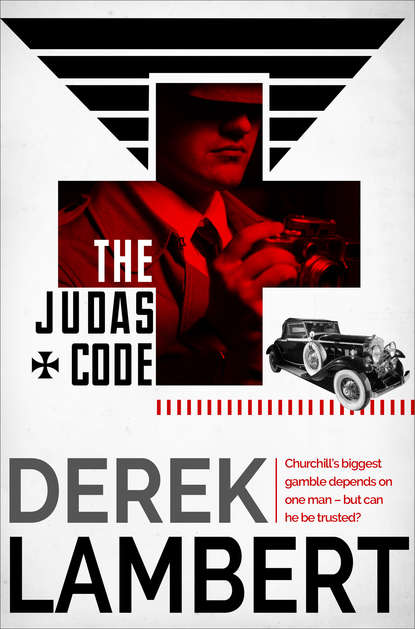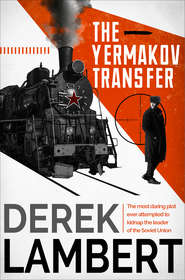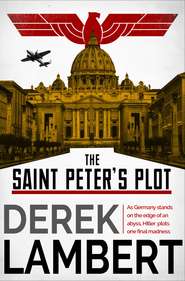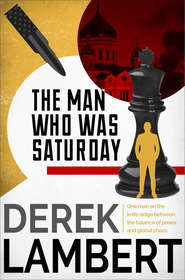По всем вопросам обращайтесь на: info@litportal.ru
(©) 2003-2024.
✖
The Judas Code
Автор
Год написания книги
2018
Настройки чтения
Размер шрифта
Высота строк
Поля
‘So was Chamberlain,’ Churchill remarked enigmatically. ‘But he was strong.’
‘I think Hoffman – we both know that his real name is neither Hoffman or Golovin – is strong. But at the moment he doesn’t realise that he’s being manipulated, so he’s cooperating.’
‘In what way is he being manipulated?’ Churchill asked impatiently.
‘Moulded would perhaps be a better word. As you well know, there have been a lot of peacemakers in evidence in recent years, and some of them are still swanning around Lisbon. Hoffman has been put in touch with them. Persuaded that he might be able to contribute something towards ending hostilities.’
Churchill said drily: ‘He might be able to do just that.’
An all-clear sounded in the distance, others joined in, an eerie but welcome orchestra on a tranquil afternoon.
‘I believe they’ve been dubbed Wailing Winnies,’ Churchill said. ‘Anything personal, do you think?’ He took off his tin hat and threw it on the grass. ‘I wonder how many more there’ll be today.’
‘I hear’, Sinclair said, ‘that they intend to put up something like 1,800.’
‘And I wonder how many will get back.’
‘More than we tell the public,’ Sinclair said.
‘You really are a pessimist, aren’t you. What about some champagne?’ He waved towards the house but Clementine was already on her way with a tray, a bottle of Möet Chandon and two glasses. ‘What a woman!’ Churchill exclaimed.
Clementine put the tray on the wooden table in front of them. ‘I’m going back for a cup of tea,’ she said. ‘But I thought you’d like a victory celebration.’
‘As if I needed an excuse,’ Churchill said, easing the cork out of the bottle.
When Clementine had gone, Sinclair said: ‘I think I’m realistic, not pessimistic. You forget I’ve been in Intelligence for a long time.’
‘Then you must realise that it’s necessary to broadcast encouraging statistics. God knows, the British people have little enough to be optimistic about. There’s not so much difference between the statistics we put out and my speeches.’
‘Your speeches are magnificent. A rallying call. The greatest weapon we have. Bar none,’ he added, so that Churchill wondered if he was casting doubts on the Grand Stratagem in which, Lisbon apart, he was the only other conspirator. How old was Sinclair? Fifty-five, something like that. When war was declared Churchill had wondered if Sinclair wasn’t too decent for his job; he had, after all, been employed by a Government that deified naïvety. But if there had been too much chivalry in his character it had been sent packing by bereavement and he now wore it as a disguise.
Sipping his champagne, Churchill stared at the white trails that had merged into a single cloud in the sky and thought: ‘I enjoyed that battle, no doubt about it; but I’m not a warmonger …’ But the introspective arguments were all too familiar. ‘I am a man for the times,’ he reassured himself. ‘And they will discard me once again when it’s all over …’
Despite the warmth, the champagne, the presence of Sinclair, he felt suddenly alone. A man for the times … a figure beckoned into an arena by circumstance.
‘And the final circumstance,’ he said, ‘will be victory. And to win that victory,’ he said to Sinclair who was looking at him curiously, ‘we have to return to the plan, the reason for your visit.’
Sinclair relaxed saying: ‘Of which Lisbon is the last instalment.’
‘But the most important. Without it the first phase will be for nothing. Now let’s run through Phase One again,’ by which he meant he would run through it.
*
The comprehensive idea, Churchill said, was to match Germany and Russia against each other in a prolonged engagement in which they would bleed each other dry. In that way the world would be rid of two tyrannies of which, by their magnitude, the Bolsheviks were the more dangerous.
On August 23, 1939, Stalin and Hitler had signed a non-aggression pact with Poland as the shared spoils. Both dictators were merely buying time because there had never been any secret about the Führer’s ultimate designs on the Soviet Union. It was, in fact, a classic pact of shared deceit. (Earlier that year Stalin might just as adroitly have signed a pact with Britain and France had they shown any inclination to throw in their lot with the Bolsheviks.)
But if Britain was to be saved – and she was militarily in no position to save herself – then she could not sit back and wait for one or other of the two despots to break their infamous alliance. While she waited she could succumb to invasion or slow death through isolation.
The first step then of Phase One was to blast the Luftwaffe out of the skies and sink as much as possible of the invasion fleet that Hitler would undoubtedly assemble across the Channel. By doing that Britain would convince Hitler that the invasion of Britain – Operation Sea Lion – was a mistake.
‘His heart isn’t in it anyway,’ Churchill said, lighting a fresh cigar and pouring them both more champagne. ‘So now we reach the crux of Phase One. Having been persuaded that his instincts are right – that it would be a mistake to invade Britain – he must then be convinced that the time is ripe to break his pact with Stalin and attack Russia. Prematurely!’ Churchill stood up and took a turn round the garden seat. ‘I’ll tell you something,’ he said, stopping in front of Sinclair. ‘Two questions will always torment historians chronicling the Second World War – until, one day, the truth comes out as it always does …’
Sinclair tilted his head politely. ‘And they are?’
‘One, why Hitler exposed himself on two fronts by invading Russia too soon.’ He stared into the bubbles rising in his glass of champagne.
‘And two?’
‘Why Stalin ignored all the warnings that Hitler intended to attack when he did.’
‘Warnings from whom?’ asked Sinclair, trying to cope with an invisible invasion force that had been assembled across the Channel, dispersed and converted into an army poised to attack the Russians.
‘Myself among others,’ said Churchill enigmatically.
Then he sat down again and continued to expound on Phase One.
If Hitler was to be persuaded to invade the Soviet Union prematurely then he must be convinced that his tactics against Britain had been successful. In other words that Britain had been forced to the edge of the negotiating table. If he believed that then the nightmare of war on two fronts would recede.
But the Führer was a wary negotiator – ‘the only mortal he wholly trusts is Adolf Hitler’ – and any suggestion that Britain was ready to come to terms would have to come from the top. From Churchill!
It would be the duty therefore of British Intelligence to get word to Hitler that Churchill was willing to discuss an armistice after he had turned against Russia. After, that was, he had proved his determination to eliminate the Bolshevik menace – an aim which Churchill shared.
At the same time he would have to be persuaded that the Red Army wasn’t prepared for such an attack. This was easy enough because Stalin himself had torn the heart out of it.
Churchill slumped back in the seat. ‘Well, what do you think?’
Sinclair said: ‘You want me to work out details of how your alleged intentions should reach Hitler?’
‘Without committing anything to paper,’ Churchill said. ‘Of course we can’t make any move through normal diplomatic channels: I’d get thrown out of the Commons if word got out that I was contemplating a deal with Adolf. Hitler will understand that.’
‘It shouldn’t be too difficult,’ Sinclair said. ‘All we need is an intelligence source that Hitler trusts – as much as he trusts anyone.’
Churchill nodded, yawned. He needed a snooze; that was the way to defeat fatigue; naps enabled you to work a long day – and night. He was grateful to Jacky Fisher for teaching him to work at night: the eccentric old First Sea Lord in the last war had started work at two a.m. and finished at two p.m.
But Churchill couldn’t snooze just yet: he had to convey the most important part of the conspiracy to Sinclair. He straightened up and said: ‘But all this will be for nought if Stalin realises that the Nazis are poised to stab him in the back.’
‘So we have to persuade him otherwise?’
‘Exactly, and that is Phase Two, the eye of the whole conspiracy. If Stalin believes that Hitler is reneging on his agreement so soon then he will mass his troops, purged or otherwise, on the borders and there will be two possible outcomes.’
Churchill paused as he caught sight of Clementine at one of the windows of the house. She was pointing at her wristwatch. The message was clear: time for your nap. He waved at her.
Sinclair filled in the first possible outcome. ‘There would be one hell of a battle.’
Churchill nodded. ‘But not the sort we want. It would be another Waterloo with one or the other side emerging victorious. We would still have an enemy and an implacable one at that.’
‘And the other outcome?’











